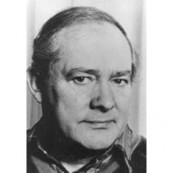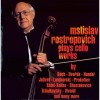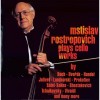Composers
Alun Hoddinott CBE (11 August 1929 – 12 March 2008) was a Welsh composer of classical music, one of the first to receive international recognition.
Hoddinott was born in Bargoed, Glamorganshire, Wales.[1] He was educated at Gowerton Grammar school before matriculating to University College, Cardiff,[1] and later studied privately with Arthur Benjamin.[2] His first major composition, the Clarinet Concerto, was performed at the Cheltenham Festival of 1954 by Gervase de Peyer with the Hallé Orchestra and Sir John Barbirolli.
This brought Hoddinott a national profile, which was followed by a string of commissions by leading orchestras and soloists. These commissions continued up to his death, and he was championed by some of the most distinguished singers and instrumentalists of the 20th century. These include singers including Dame Margaret Price, Dame Gwyneth Jones, Sir Thomas Allen, Jill Gomez, Sir Geraint Evans and more recently Claire Booth, Helen Field, Gail Pearson and Jeremy Huw Williams. Instrumentalists have included Ruggiero Ricci, Mstislav Rostropovich, Dennis Brain, Osian Ellis, Cecil Aronowitz, Nia Harries, John Ogdon to name a few, and more recently euphonium player David Childs, cellist Kathryn Price, trombonist Mark Eager and song pianist Andrew Matthews-Owen.
Hoddinott was prolific, writing symphonies, sonatas, and concertos: his style evolved over a long and distinguished career, from the neo-classicism of the Clarinet Concerto to a brand of serialism which allowed a tonal framework to the structure, combining a penchant for dark textures and brooding harmonies similar to that of another British composer, Alan Rawsthorne, with Bartokian arch-forms and palindromes. However, his move into opera from 1970 helped to broaden his stylistic range and lighten his palette. His music often displays a brooding, darkly lyrical intensity, manifested in his nocturnal slow movements. One of the best examples is his rhapsodic Poem for violin and orchestra, inspired by a line from James Joyce, The Heaventree of Stars. Combining tough, disciplined writing with a sense of the mysterious and unknown, his musical style has been described as "modernist romantic".[3][4]
Alun Hoddinott was also a gifted teacher and, as Professor of Music at University College, Cardiff, was responsible for the expansion of the Department of Music (with a purpose-built building) which became the largest in Europe in the 1980s. Hoddinott taught a number of talented composers during his time at Cardiff, including the Irish composer John Buckley and Welsh composers Karl Jenkins, Jeffrey Lewis, John Metcalf and Christopher Painter.
He was awarded honorary doctorates from numerous leading musical institutions, including the Royal Academy of Music, the Royal Northern College of Music and the Royal Welsh College of Music & Drama, as well as the Walford Davies Award.[5] He was appointed a Commander of the Order of the British Empire (CBE) in the 1983 New Year Honours.[6]
In 2005, Hoddinott produced a fanfare to be performed at the wedding of Charles, Prince of Wales, to Camilla Parker Bowles, having previously written works to celebrate Prince Charles' 16th birthday and his investiture.[2]
In 1997 Alun Hoddinott received the Glyndŵr Award for an Outstanding Contribution to the Arts in Wales during the Machynlleth Festival. He also received a Lifetime Achievement Award from the Arts Council of Wales in 1999, and Fellowship of the Welsh Music Guild.
On 1 March 2007 (Saint David's Day) soprano Helen Field and baritone Jeremy Huw Williams gave the world premiere of his orchestral song cycle Serenissima with the BBC National Orchestra of Wales at St David's Hall.[5] It was announced on this occasion that the new home of the BBC National Orchestra of Wales in the Wales Millennium Centre in Cardiff would include a specially built 350-seat concert hall, named BBC Hoddinott Hall (Welsh: Neuadd Hoddinott y BBC). The Millennium Centre was opened on 22 January 2009, on which occasion Queen Elizabeth II presented Hoddinott with a medal.
Alun Hoddinott died on 12 March 2008 at Morriston Hospital, Swansea, aged 78, the day after the world premiere at the Wigmore Hall of his Music for String Quartet, given by the Sacconi Quartet. His very last work, the orchestral tone poem "Taliesin", was premiered by the BBC National Orchestra of Wales at the Swansea Festival of Music in October 2009.
Refine by search
view all| Country: | United Kingdom |
| Period: | Neoclassicism |
Biography
Alun Hoddinott CBE (11 August 1929 – 12 March 2008) was a Welsh composer of classical music, one of the first to receive international recognition.
Hoddinott was born in Bargoed, Glamorganshire, Wales.[1] He was educated at Gowerton Grammar school before matriculating to University College, Cardiff,[1] and later studied privately with Arthur Benjamin.[2] His first major composition, the Clarinet Concerto, was performed at the Cheltenham Festival of 1954 by Gervase de Peyer with the Hallé Orchestra and Sir John Barbirolli.
This brought Hoddinott a national profile, which was followed by a string of commissions by leading orchestras and soloists. These commissions continued up to his death, and he was championed by some of the most distinguished singers and instrumentalists of the 20th century. These include singers including Dame Margaret Price, Dame Gwyneth Jones, Sir Thomas Allen, Jill Gomez, Sir Geraint Evans and more recently Claire Booth, Helen Field, Gail Pearson and Jeremy Huw Williams. Instrumentalists have included Ruggiero Ricci, Mstislav Rostropovich, Dennis Brain, Osian Ellis, Cecil Aronowitz, Nia Harries, John Ogdon to name a few, and more recently euphonium player David Childs, cellist Kathryn Price, trombonist Mark Eager and song pianist Andrew Matthews-Owen.
Hoddinott was prolific, writing symphonies, sonatas, and concertos: his style evolved over a long and distinguished career, from the neo-classicism of the Clarinet Concerto to a brand of serialism which allowed a tonal framework to the structure, combining a penchant for dark textures and brooding harmonies similar to that of another British composer, Alan Rawsthorne, with Bartokian arch-forms and palindromes. However, his move into opera from 1970 helped to broaden his stylistic range and lighten his palette. His music often displays a brooding, darkly lyrical intensity, manifested in his nocturnal slow movements. One of the best examples is his rhapsodic Poem for violin and orchestra, inspired by a line from James Joyce, The Heaventree of Stars. Combining tough, disciplined writing with a sense of the mysterious and unknown, his musical style has been described as "modernist romantic".[3][4]
Alun Hoddinott was also a gifted teacher and, as Professor of Music at University College, Cardiff, was responsible for the expansion of the Department of Music (with a purpose-built building) which became the largest in Europe in the 1980s. Hoddinott taught a number of talented composers during his time at Cardiff, including the Irish composer John Buckley and Welsh composers Karl Jenkins, Jeffrey Lewis, John Metcalf and Christopher Painter.
He was awarded honorary doctorates from numerous leading musical institutions, including the Royal Academy of Music, the Royal Northern College of Music and the Royal Welsh College of Music & Drama, as well as the Walford Davies Award.[5] He was appointed a Commander of the Order of the British Empire (CBE) in the 1983 New Year Honours.[6]
In 2005, Hoddinott produced a fanfare to be performed at the wedding of Charles, Prince of Wales, to Camilla Parker Bowles, having previously written works to celebrate Prince Charles' 16th birthday and his investiture.[2]
In 1997 Alun Hoddinott received the Glyndŵr Award for an Outstanding Contribution to the Arts in Wales during the Machynlleth Festival. He also received a Lifetime Achievement Award from the Arts Council of Wales in 1999, and Fellowship of the Welsh Music Guild.
On 1 March 2007 (Saint David's Day) soprano Helen Field and baritone Jeremy Huw Williams gave the world premiere of his orchestral song cycle Serenissima with the BBC National Orchestra of Wales at St David's Hall.[5] It was announced on this occasion that the new home of the BBC National Orchestra of Wales in the Wales Millennium Centre in Cardiff would include a specially built 350-seat concert hall, named BBC Hoddinott Hall (Welsh: Neuadd Hoddinott y BBC). The Millennium Centre was opened on 22 January 2009, on which occasion Queen Elizabeth II presented Hoddinott with a medal.
Alun Hoddinott died on 12 March 2008 at Morriston Hospital, Swansea, aged 78, the day after the world premiere at the Wigmore Hall of his Music for String Quartet, given by the Sacconi Quartet. His very last work, the orchestral tone poem "Taliesin", was premiered by the BBC National Orchestra of Wales at the Swansea Festival of Music in October 2009.



![Great European Organs. 44-Jane Watts [Rochester Cathedral]](http://static.classicalm.com/repository/collection-cover/small/927-img1341928085783235.jpg)

